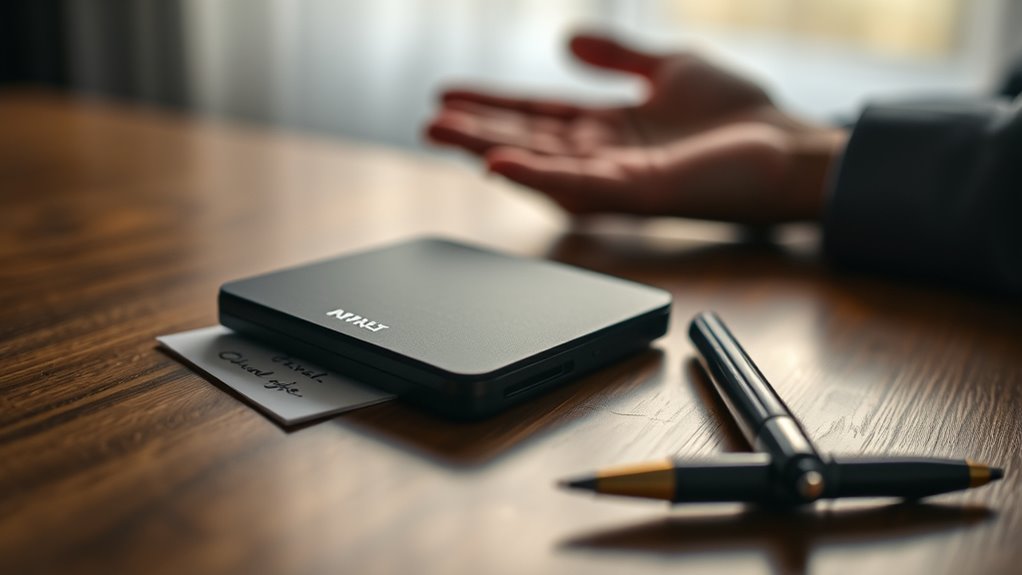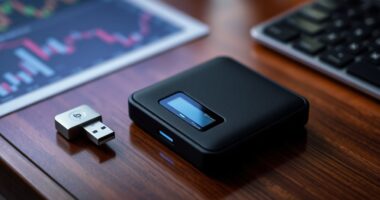Social recovery wallets let you trust friends or contacts to help recover your digital assets if you lose access to your private keys. Instead of remembering seed phrases, your trusted network safeguards your assets through collaborative effort, reducing the risk of theft or accidental loss. You choose who can assist and set thresholds to control recovery. This shared responsibility aligns with blockchain’s decentralized principles. Curious how to build such a trusted network? Keep going to discover more.
Key Takeaways
- Social recovery wallets use trusted contacts to help recover access to large digital assets securely.
- They eliminate the need to store seed phrases, reducing the risk of theft or loss.
- Users select trusted friends or contacts who hold partial shares for recovery if needed.
- The system distributes responsibility, minimizing single points of failure and enhancing asset safety.
- This approach aligns with blockchain principles by decentralizing control and fostering collective trust.

Social recovery wallets are innovative tools designed to enhance the security and accessibility of your digital assets. Instead of relying solely on traditional key management methods, these wallets leverage the power of trust networks to safeguard your cryptocurrencies and valuable digital holdings. With social recovery, you no longer need to remember complex seed phrases or private keys. Instead, you select trusted friends or contacts who can help you recover access if you lose your device or forget your credentials. This approach simplifies key management by distributing the recovery process across a network of trusted individuals, reducing the risk of losing access due to mistakes or hardware failures.
When you set up a social recovery wallet, you create a list of trusted contacts—your trust network—who hold partial shares of your recovery process. If you ever find yourself locked out, you can reach out to these contacts, and collectively, they can help restore your wallet. This method distributes the responsibility and reduces single points of failure, making your digital assets more resilient against theft, hacking, or accidental loss. The process is designed to be user-friendly, allowing you to define how many of your contacts need to participate for successful recovery, giving you flexibility and control over your security.
Trust networks are at the heart of social recovery wallets. They are built on relationships you choose carefully, ensuring only trusted individuals can assist in your recovery. This system not only boosts security but also provides peace of mind, knowing that your assets aren’t dependent on a single seed phrase or private key stored in a vulnerable location. Instead, your assets are protected by a collaborative effort, where your trusted friends act as your security partners. This model aligns well with the decentralized ethos of blockchain technology, emphasizing collective trust and shared responsibility. Additionally, understanding the underlying trust models can help you design more effective security strategies for your digital assets.
The key management process in social recovery wallets is designed to be transparent and straightforward. You assign roles and set thresholds—how many friends need to confirm your identity for you to regain access. This way, even if one or two contacts are unavailable or untrustworthy, your recovery process remains secure and reliable. It’s a clever way to decentralize control without compromising convenience. Plus, as your trust network evolves, you can update it easily, adding or removing contacts as needed, ensuring your recovery strategy adapts over time.
Frequently Asked Questions
How Secure Are Social Recovery Wallets Against Malicious Actors?
Social recovery wallets can be vulnerable to malicious actors through social engineering, where scammers manipulate your trusted contacts. While they offer convenience, they also raise privacy concerns, as sharing recovery info may expose sensitive data. You should carefully choose trustworthy friends, implement multi-factor safeguards, and stay aware of potential social engineering tactics. Doing so helps protect your assets and maintains your privacy, making social recovery wallets more secure.
Can I Choose Any Friends as Trusted Contacts?
You can choose your friends as trusted contacts, but careful friend selection is vital. Trust criteria should include their reliability, honesty, and willingness to help if needed. Not everyone makes a good trusted contact, so evaluate their integrity and how well they understand your needs. Remember, selecting the right friends ensures your recovery process stays secure, and your assets remain protected. Choose wisely based on trustworthiness and their ability to support you.
What Happens if a Trusted Contact Is Unavailable During Recovery?
If your trusted contact is unavailable during recovery, trusted contact limitations can cause delays in the process. You might need to wait longer or try alternative recovery methods, which could slow down regaining access. To prevent recovery process delays, it’s best to choose contacts who are reliable and reachable. Keep in mind that trusted contact limitations exist to guarantee security, but they could pose challenges if your contact is temporarily unavailable.
Are Social Recovery Wallets Compatible With All Cryptocurrencies?
Social recovery wallets aren’t compatible with all cryptocurrencies, especially when comparing custodial vs noncustodial options. They mainly work with popular noncustodial wallets like Ethereum or Bitcoin. Integration with hardware wallets can enhance security, but not all cryptocurrencies support this feature. Before choosing a social recovery method, check if your crypto supports hardware wallet integration and whether the wallet is custodial or noncustodial to guarantee seamless recovery.
How Do Social Recovery Wallets Compare to Traditional Multi-Signature Wallets?
Social recovery wallets offer a different approach to key management compared to traditional multi-signature wallets. They prioritize user experience by allowing you to recover access through trusted contacts instead of managing multiple keys yourself. While multi-signature wallets require coordination among multiple private keys, social recovery simplifies this process, making it more accessible. However, it introduces reliance on your trusted network, which may affect security depending on your relationships.
Conclusion
Social recovery wallets let you trust friends to safeguard your assets, making losing access less intimidating. By involving trusted contacts, you build a safety net that’s both secure and user-friendly. Just choose your friends wisely, and you’ll feel confident knowing your millions are protected even if you forget your password. It’s a smarter way to secure your crypto, giving you peace of mind and a reliable backup plan.









